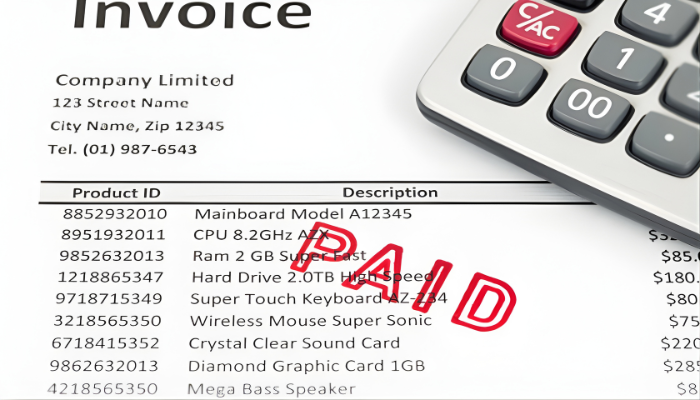
No business wants to experience an IRS (Internal Revenue Service) audit, and while only around 1%-2% of small businesses will face one, it's better to be prepared. IRS investigations compare your business operations and expenses with what you reported on your income tax return. Discrepancies can lead to tax penalties and owing money to the IRS. Here’s how to handle IRS audits as a small business owner.
Prepare for an Audit
The point of IRS audits is to ensure accuracy between what a business reports on tax returns and its actual earnings and expenses. During the audit, the IRS will ask specific questions and request information to verify your reports. Understanding what the IRS will want to know can help you prepare and avoid surprises.
Start by thoroughly reviewing the tax returns involved in the audit. Be ready to explain how you or your tax preparer calculated the figures. Gather all records you used for tax reporting, such as business receipts, checks, bank statements, and appointment books. Good record-keeping can simplify the audit process.
Find Out What the IRS Wants to Know
IRS auditors examine both your small business and your personal financial habits. They will look at your lifestyle and spending, assessing whether your property, jewelry, and vehicles reflect the income reported. If discrepancies are found, the auditor will dig deeper into your finances. If your business deals mainly in cash, expect a closer inspection due to the potential for unreported sales. Be prepared to show strong documentation for any business expenses you claimed, such as meals, entertainment, and travel.
The IRS will request documents supporting the income, deductions, or credits on your tax return, including:
- Bills
- Receipts
- Legal Papers
- Loan Agreements
- Employment Documents
- Documentation of Theft or Loss
- Tickets
For mail audits, send copies, not originals, and include explanations that highlight the business relevance of each document. This can help validate your claims and reduce scrutiny.

Why Am I Being Selected for an Audit?
Selection for an audit only sometimes suggests there's a problem. The IRS uses several methods:
- Random selection and computer screening: Returns are selected based on a statistical formula, comparing your tax return against norms for similar returns. These norms come from audits of a statistically valid random sample of returns.
- Related examinations: Your returns might be selected if they involve issues or transactions with other taxpayers, such as business partners or investors, whose returns were selected for audit.
An experienced auditor reviews the return. They may accept it, or if something questionable is noted, they will forward the return for assignment to an examination group.
Notification and Conduct of the Audit
If your account is selected for audit, the IRS will notify you by mail. They won't initiate an audit by telephone.
Audits are conducted either by mail or through an in-person interview to review your records. The interview may be at an IRS office (office audit) or at the taxpayer's home, place of business, or accountant's office (field audit). The IRS will provide all contact information and instructions in the letter you receive.
If the audit is by mail, the letter will request additional information about certain items shown on the tax return, such as income, expenses, and itemized deductions. If you have too many records to mail, you can request a face-to-face audit.
Unreported Income and Worker Classification
Auditors are vigilant about unreported income. Failing to report income over $10,000 can lead to serious legal issues. If you find yourself in this situation, hire a tax professional to handle your audit. Misclassifying employees as independent contractors can also create payroll tax issues.
During an audit, expect detailed questioning about your business operations, expenses, and purchasing history. If your tax returns are complex, with many exemptions and high amounts, consider hiring a tax attorney to represent you.
How Far Back Can the IRS Audit?
Generally, the IRS can include returns filed within the last three years in an audit. If a substantial error is identified, they may add additional years, usually not going back more than six years. However, in cases of suspected fraud or if you have not filed returns, there is no limit on how far back the IRS can audit. Understanding these time frames is crucial for maintaining proper records and documentation. Keeping detailed financial records for at least six years is a good practice to ensure you have the necessary documentation if the IRS decides to conduct an extended audit.

What Are Your Rights During an Audit?
According to the IRS's Publication 1, “Your Rights as a Taxpayer," you have several important rights during an audit. These rights include:
- The Right to Be Informed: You have the right to know what you need to do to comply with the tax laws. You are entitled to clear explanations of the laws and IRS procedures in all tax forms, instructions, publications, notices, and correspondence. You also have the right to be informed of IRS decisions about your tax accounts and to receive clear explanations of the outcomes.
- The Right to Quality Service: You have the right to receive prompt, courteous, and professional assistance in your dealings with the IRS, to be spoken to in a way you can easily understand, and to receive clear and easily understandable communications from the IRS.
- The Right to Pay No More than the Correct Amount of Tax: You have the right to pay only the amount of tax legally due, including interest and penalties, and to have the IRS apply all tax payments properly.
- The Right to Challenge the IRS's Position and Be Heard: You have the right to raise objections and provide additional documentation in response to formal IRS actions or proposed actions, to expect that the IRS will consider your timely objections and documentation promptly and fairly, and to receive a response if the IRS does not agree with your position.
- The Right to Appeal an IRS Decision in an Independent Forum: You are entitled to a fair and impartial administrative appeal of most IRS decisions, including many penalties, and have the right to receive a written response regarding the Office of Appeals' decision. You generally have the right to take your case to court.
- The Right to Finality: You have the right to know the maximum amount of time you have to challenge the IRS's position as well as the maximum amount of time the IRS has to audit a particular tax year or collect a tax debt. You also have the right to know when the IRS has finished an audit.
- The Right to Privacy: You have the right to expect that any IRS inquiry, examination, or enforcement action will comply with the law and be no more intrusive than necessary, will respect all due process rights, including search and seizure protections, and will provide, where applicable, a collection due process hearing.
- The Right to Confidentiality: You have the right to expect that any information you provide to the IRS will not be disclosed unless authorized by you or by law. You have the right to expect appropriate action will be taken against employees, return preparers, and others who wrongfully use or disclose taxpayer return information.
- The Right to Retain Representation: You have the right to retain an authorized representative of your choice to represent you in your dealings with the IRS. You also have the right to seek assistance from a Low Income Taxpayer Clinic if you cannot afford representation.
- The Right to a Fair and Just Tax System: You have the right to expect the tax system to consider facts and circumstances that might affect your underlying liabilities, ability to pay, or ability to provide information timely. You have the right to receive assistance from the Taxpayer Advocate Service if you are experiencing financial difficulty or if the IRS has not resolved your tax issues properly and timely through its normal channels.
It is possible to get through an IRS audit successfully with the right preparation and professional help. Learn more about IRS audits on the official IRS website and ensure your business is ready for any eventuality.
*Originally posted January 26th 2017, Updated June 25th 2024















